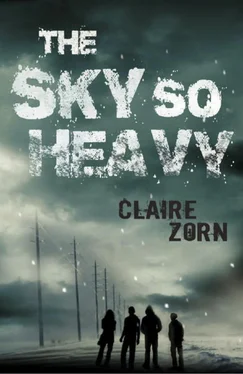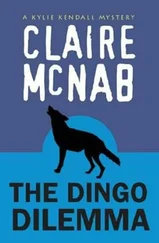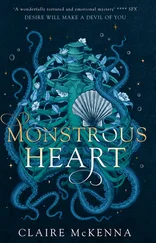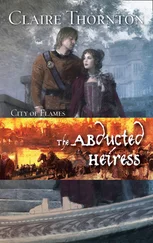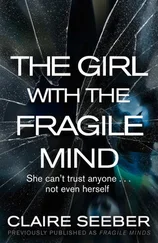Ration day. This time I head out with Lucy and keep my thoughts about her safety to myself. She hasn’t been out like this in the daylight (I use this term loosely) before. We walk along the street and she gapes at the state of the place, the rubbish, the desperate chaos of it all.
The army truck is parked in the same place as it was last time. The line for food is three blocks long. We inch forward at a glacial pace. The worst part is the cold. It eats at your toes and fingers first, then moves on for its share of your limbs. People grow impatient, sighing loudly and muttering ‘Oh, come on ’ as if it will make a difference. Then they start comparing stories: ‘We waited three hours last week’, ‘Have you seen the size of the water bottles? It’s a joke!’
‘Jeez, there better not be any illegals here,’ says someone loudly. ‘I bet there bloody is, didn’t take this long last week.’
‘Yeah,’ says Lucy. ‘They’re taking our share, scum!’
People jeer in agreement. I elbow her, only encouraging her more.
‘Should go back to where they bloody came from!’ she says.
‘Too right, sweetheart!’ says someone and everyone else murmurs in agreement. The line crawls forward. Two hours later we are metres from the truck. An army officer hands a bag of rice to a man ahead of us.
‘Is that it?’ he says. ‘That’s a fucking crime!’
‘Move on,’ replies an officer standing beside the line.
‘No, I won’t move on. Give us another bag, that’s a fucking disgrace, that is.’
‘MOVE ON.’
‘I’m not going anywhere, mate, until I get my share. Wouldn’t feed a rabbit on that.’
‘Move on or I will arrest you.’
‘Go on then, arsehole. Arrest me.’ The guy shoves the officer in the chest. Three more behind him join in, pushing and shoving the army guy before he has a chance to reach for his gun. The other officer grabs one of them, punches him in the jaw. And then, like a school of sharks after a drop of blood, the people around us start to yell and push, storming the truck, clambering on, grabbing at food. I grip Lucy’s hand as the crowd surges around us. People snatch food from one another, men throw punches, women claw. Others squeal and cry. We are caught in the thick of people as they screech and scramble, kicking, gouging. Lucy is pulled from my grip by the tide of bodies. I scream her name, pushing against limbs. And then there is a loud hissing sound and a mist of smoke cascades over the people. The burn that singes my eyes is agonising. I clamber, tears and salt streaming down my cheeks. Still, I scream her name, stumbling in my blindness. Then comes the spit and pop of gunfire. Screaming. Instinctively I fall to the ground, arms shielding my head, as if they would be of any use. I curl as feet scuff and tread over my limbs. Others fall. I scream Lucy’s name again.
The scramble quietens. When the burning in my eyes has eased I lift my head. Around me some are doing the same. Others are not moving at all, their bodies lying twisted and lifeless. Metres from me the man who complained about illegals lies with half his face missing. I feel the tingle of blood rushing from my head but fight it, knowing that if I pass out I won’t find Lucy. My legs arrange themselves so I am standing. I pick my way through the people. There is moaning and sobbing, pools of blood and vomit and piss. I scream for Lucy again. I can’t remember what she was wearing and peer down at the faces of the fallen as I make my way to the side of the road. Around me, people stumble, clutching at each other.
‘Have you seen a girl? Dark hair, pretty, my age?’
They look at me as if I am speaking a foreign language.
I wander along the footpath calling her name and then, cowering in the doorway of a shopfront, I find her. She is curled in a ball, hands clutching her ankle.
‘Lucy?’
She sees me and begins to cry. I wrap myself around her.
‘Are you hurt? Your ankle?’
‘Someone stomped on it. Fin, I thought you were dead.’
‘Can you stand?’ I try to help her to her feet.
She tries but I see her wince with pain when she attempts to walk.
‘Put your arms around my neck.’
She does and I lift her up. I walk back to the car park with her in my arms. She closes her eyes, head against my chest.
‘Tell me when I wake up that this has all been a bad dream,’ she whispers.
Word about the riot has already spread to the car park by the time we get back. Noll is layering up, ready to come looking for us. He visibly relaxes with relief when I walk down the ramp with Lucy. The whole place is subdued with a new tension that evening, nobody feels completely at ease. We eat little and turn in for the night. I hold Lucy close as we sleep.
The mood among our group has flatlined. Except for Max. He deals with uncertainty by maintaining a constant stream of chatter and has taken it upon himself to be chief morale-booster. He does this mainly by telling us inane facts that he learnt from National Geographic .
‘Did you know that octopi are really smart? It’s true. They collect coconut shells and use them to build houses.’
I have one of those moments when my affection for him is so fierce, it is frightening. Somewhere inside I think I should be doing the opposite, I should be trying to let go – trying to let go of him, of everyone, so when the end comes the blow won’t be as hard. But how do you do that?
I wonder how the octopi are doing now, if much has changed for them.
The cold is getting into my bones, burrowing through the blankets like they’re tissue paper. Some of the women in the camp have gone into the shopping centre and collected all the plastic shopping bags. Rosa shows us how they can be torn into strips and knitted into blankets that insulate well. Everyone in the camp starts to work on blankets. It’s weirdly peaceful. Noll and I tear the bags into strips and wind the lengths into balls to be knitted. Lucy knows how to knit and she shows Max how to do it – it’s the kind of weird thing he finds fascinating. The days start to feel different now we have something concrete to work on, there’s a rhythm to them that lifts the mood in the camp and people have started chatting to each other again.
More people come to the car park. More illegals. It makes Rosa nervous, she paces from one camp to another, craning her neck, supervising.
In the middle of the night someone screams and it ricochets around the concrete bunker, stabbing into the silence. There is a scuffle of shadows in the south corner, near the exit ramp. More yelling. People around us start to get up and head toward the noise, carrying torches. We follow.
There is a guy in an army uniform backed up against the wall. Shouts are flung at him and he cowers a little. He holds up his palms like he is trying to calm a pack of wild animals.
‘I’m a deserter, I’m a deserter,’ he repeats. ‘I’m lookin’ for shelter. Please.’
They aren’t listening. The men are shouting at him. Women – mothers – throw random objects, the children copy. One kid, about eight years old, throws a glass bottle and it shatters against the wall.
‘He’s army and now he knows we are here,’ yells someone. ‘We have to deal with him.’
Another guy grabs him by the arm, twists it behind his back. It’s then that I see the army guy has an assault rifle slung across his back. The guy that holds him takes the rifle, passes it to another guy who aims it at the army guy’s head. I move through the people to try to get a better view. Alan is behind me, he yells for calm in his booming voice. Nobody pays any attention.
‘Shoot him!’ yells someone. Others join in. I get close enough to see the army guy’s face. He sees mine.
Читать дальше
